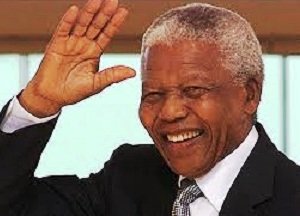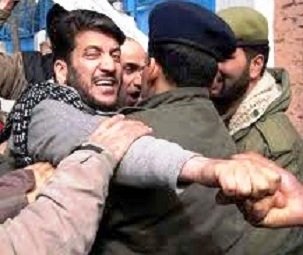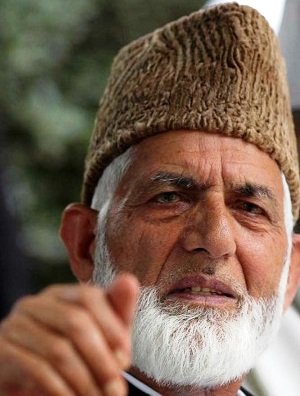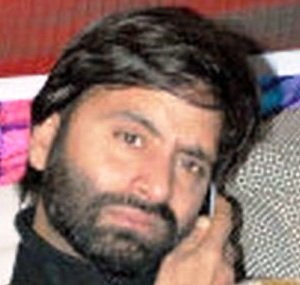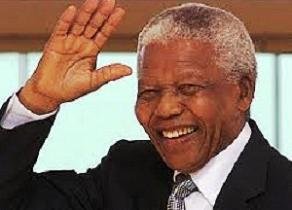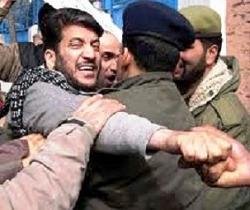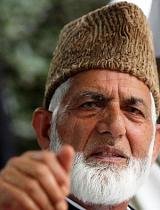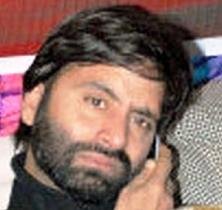Kashmir agonised at Madeba’s loss
Mohan Das Karamchand Gandhi rose to pinnacle prominence and became Mahatma when destiny led him to accept an accountant´s job, for a meagre salary offered by Bombay´s Abdullah Seth, in South Africa. Mahatma joining in to play his role in the struggle against apartheid reached the apex; and India received a well groomed visionary, a unifying force to lead an enslaved nation to achieve the cherished goal of independence.
Nelson Rolihlahla Mandela, social activist, a philanthropist chose lockups, prisons, detention centres and torture chambers to an undisturbed reasonably comfortable life as a lawyer. A daunting political struggle against a racist white minority rule cost him twenty seven years of youth punished and branded as a "terrorist" and at the same time, unfortunately, the conscious world watched helplessly, knowingly ignoring the happenings in South Africa.
China Daily reports (06 December, 2013) that Kashmir held by India condoled the passing away of anti-apartheid icon Nelson Mandela. Kashmiri leaders joined by the populace in unison mourned the death paying tributes to a towering personality. Madiba held in very high esteem by people of Kashmir for unstinting support the South African symbol of belief extended to suffering people of a devastated nation. Nelson Mandela member of the clan Madiba is popularly associated and affectionately given this name to show love and esteem held by one and all for him.
In 1998 first time in history, Mandela spoke for Kashmir at Non-Aligned Movement Summit highlighting its predicament and stressed that Kashmir question must be solved through peaceful negotiations describing it as "a concern for all of us". The meeting attended by a galaxy of world leaders included then prime minister AB Vajpayee of India and UN Secretary General Kofi Annan. Mandela resolved that "NAM would extend all strength that it has in settling the contentious Kashmir issue".
Mandela seen as a role model; his name became a household name as Kashmiri leader Shabir Ahmed Shah for spending more than twenty two years in Indian prisons came to be known as Nelson Mandela of Kashmir, sometimes also referred to as a ´jailbird´. Shah like Mandela, having spent much time of his life in Indian jails, gained coverage as an Amnesty International Prisoner of Conscience.
Kashmiri leaders fighting for Indian occupation Ali Shah Geelani, Muhammad Yasin Malik, Shabir Ahmed Shah and Mirwaiz Omar Farooq paid high tributes to an icon of righteousness expressing grief and sorrow at the loss of a historical personality and inspiring leader of the masses. The leaders mentioned above and many others suffered immensely with many years extended prison sentences, torture, house arrests and confinements. Kashmiri leadership and people saw Mandela as a beacon of light to give Kashmir hope, inspiration, resolve, and mental strength to face the wrath and onslaught of the occupational forces.
Turning the pages of history of the recent past, BJP (Bhartiya Janata Party) embarrassed by NAM Secretary General Mandela’s stand on Kashmir, the Indian media reported that India took Mandela to task for raising Kashmir issue for making a reference in the NAM Summit and alleged this to be a "broken tradition for raking up bilateral issues". A third party intervention, as is known, is irksome touching Indian sensitivities and is considered the main reason for India to be averse to a third party intervention as it does not want to face the truth having no answer for the questions thus raised.
Then ruling BJP immediately reacted by denouncing President Mandela for making a reference to Kashmir, stating he had broken the tradition of not raking up any bilateral issue at an international forum. BJP Vice-President K L Sharma said in New Delhi that Mandela departed from the convention that no bilateral issue should be raised at the Non-Aligned Movement. He, very conveniently, said the BJP had a consistent stand on Kashmir which was an issue between Pakistan and India. "No third-party interference would be allowed in it".
Pakistan upholds the right of the people of Kashmir to self-determination in accordance with the resolutions of the United Nations Security Council. The resolutions of 1948 and 1949 provide for the holding of a free and impartial plebiscite for the determination of the future of the State by the people of Kashmir.
Business Standard of India reports, December 09, 2013, quoting US State Department spokesperson Marie Harf, saying "US believes India and Pakistan need to keep building a better relationship and work together on issues like Kashmir". United States believes Kashmir sitting on a volcano needs careful handling and wants to play safe diplomatically with both India and Pakistan. The leadership in US realises and as a policy matter without touching Indian sensitivities knows that solution to Kashmir as per the wish of Kashmiri people is imperative and vital to peace in the world.
A political hype and nervousness received a fillip on international level when Pakistan´s Prime Minister Nawaz Sharif stated (December 04, 2013) that "Kashmir can trigger fourth war with India".
Comments
There are 0 comments on this post


